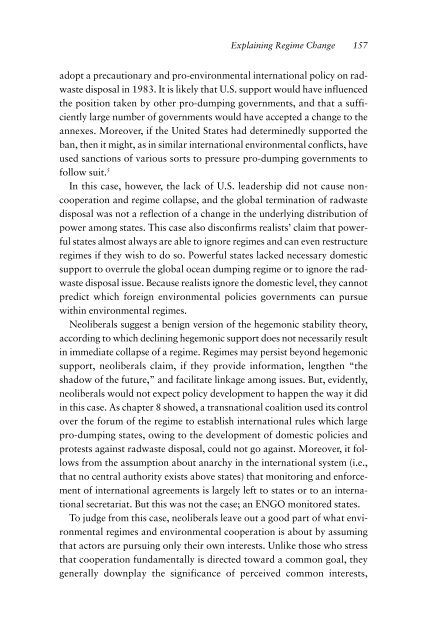Radioactive Waste Disposal at Sea: Public Ideas ... - IMO
Radioactive Waste Disposal at Sea: Public Ideas ... - IMO
Radioactive Waste Disposal at Sea: Public Ideas ... - IMO
You also want an ePaper? Increase the reach of your titles
YUMPU automatically turns print PDFs into web optimized ePapers that Google loves.
Explaining Regime Change 157<br />
adopt a precautionary and pro-environmental intern<strong>at</strong>ional policy on radwaste<br />
disposal in 1983. It is likely th<strong>at</strong> U.S. support would have influenced<br />
the position taken by other pro-dumping governments, and th<strong>at</strong> a sufficiently<br />
large number of governments would have accepted a change to the<br />
annexes. Moreover, if the United St<strong>at</strong>es had determinedly supported the<br />
ban, then it might, as in similar intern<strong>at</strong>ional environmental conflicts, have<br />
used sanctions of various sorts to pressure pro-dumping governments to<br />
follow suit. 5<br />
In this case, however, the lack of U.S. leadership did not cause noncooper<strong>at</strong>ion<br />
and regime collapse, and the global termin<strong>at</strong>ion of radwaste<br />
disposal was not a reflection of a change in the underlying distribution of<br />
power among st<strong>at</strong>es. This case also disconfirms realists’ claim th<strong>at</strong> powerful<br />
st<strong>at</strong>es almost always are able to ignore regimes and can even restructure<br />
regimes if they wish to do so. Powerful st<strong>at</strong>es lacked necessary domestic<br />
support to overrule the global ocean dumping regime or to ignore the radwaste<br />
disposal issue. Because realists ignore the domestic level, they cannot<br />
predict which foreign environmental policies governments can pursue<br />
within environmental regimes.<br />
Neoliberals suggest a benign version of the hegemonic stability theory,<br />
according to which declining hegemonic support does not necessarily result<br />
in immedi<strong>at</strong>e collapse of a regime. Regimes may persist beyond hegemonic<br />
support, neoliberals claim, if they provide inform<strong>at</strong>ion, lengthen “the<br />
shadow of the future,” and facilit<strong>at</strong>e linkage among issues. But, evidently,<br />
neoliberals would not expect policy development to happen the way it did<br />
in this case. As chapter 8 showed, a transn<strong>at</strong>ional coalition used its control<br />
over the forum of the regime to establish intern<strong>at</strong>ional rules which large<br />
pro-dumping st<strong>at</strong>es, owing to the development of domestic policies and<br />
protests against radwaste disposal, could not go against. Moreover, it follows<br />
from the assumption about anarchy in the intern<strong>at</strong>ional system (i.e.,<br />
th<strong>at</strong> no central authority exists above st<strong>at</strong>es) th<strong>at</strong> monitoring and enforcement<br />
of intern<strong>at</strong>ional agreements is largely left to st<strong>at</strong>es or to an intern<strong>at</strong>ional<br />
secretari<strong>at</strong>. But this was not the case; an ENGO monitored st<strong>at</strong>es.<br />
To judge from this case, neoliberals leave out a good part of wh<strong>at</strong> environmental<br />
regimes and environmental cooper<strong>at</strong>ion is about by assuming<br />
th<strong>at</strong> actors are pursuing only their own interests. Unlike those who stress<br />
th<strong>at</strong> cooper<strong>at</strong>ion fundamentally is directed toward a common goal, they<br />
generally downplay the significance of perceived common interests,

















